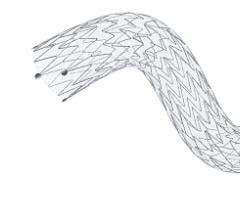
CGuard Carotid Stent
February 28, 2022 – InspireMD, Inc., a global developer of the CGuard Embolic Prevention Stent System (EPS) device for the treatment of carotid artery disease and stroke prevention, today announced its CGuard Carotid Stent, utilizing its proprietary MicroNet mesh, will be included as a device option for stenting in the CREST-2 Trial. Following the approval of the Carotid Revascularization Endarterectomy or Stenting Trial (CREST-2) Investigational Device Exemption (IDE) supplement application from the U.S. Food and Drug Administration (FDA) last week, InspireMD will be evaluating strategic sites to enable expediated access.
Marvin Slosman, Chief Executive Officer of InspireMD commented, "This approval for use of CGuard EPS in a trial as significant as CREST-2 is proxy to the validation of our technology platform, contributing to this important work. The CREST-2 Trial is widely acknowledged as the most significant ongoing trial to scientifically investigate the optimal course of treatment to prevent stokes for asymptomatic patients with significant carotid disease. The opportunity to be a part of CREST-2 is a tremendous milestone for our company, and we look forward to CGuard playing an important role in the stenting results," Mr. Slosman added.
The study first enrolled patients in 2014, as two parallel multi-center randomized, observer-blinded endpoint clinical trials with the purpose of being to determine the best way to prevent strokes in patients with high grade carotid stenosis but no stroke symptoms related to that blockage. The trial will enroll an estimated 2,480 participants which will remain in the study for 4 years following the start of intervention.
“The CREST-2 Executive Committee is keenly focused on positioning the results of the trial to be relevant, actionable, and informative to contemporary practices,” said Dr. Thomas Brott, Principal Investigator of the NINDS sponsored trial. “Over the course of the trial we have continually introduced state of the art medical, pharmacological therapies to reduce the risk of stroke in our randomized patient population. It is critical of any long-term study to remain aligned with evolving technology and relevant devices. After examining the extensive clinical experience with the CGuard stent and the large body of evidence to its effectiveness, the study executive committee felt it appropriate to include this stent as a treatment option. Patients that agree to participate in the CREST-2 Trial, depending on accessibility and operator training and discretion, will now have access to this state of the art, carotid stent device.”
About Carotid Revascularization and Medical Management for Asymptomatic Carotid Stenosis Trial (CREST-2)
CREST-2 is two independent, parallel, multicenter, randomized controlled trials of carotid revascularization and intensive medical management versus medical management alone in patients with asymptomatic high-grade carotid stenosis. One trial randomizes patients in a 1:1 ratio to endarterectomy versus no endarterectomy and another randomizes patients in a 1:1 ratio to carotid stenting with embolic protection versus no stenting. Medical management is uniform for all randomized treatment groups and is centrally directed. The purpose of this trial is to determine the best way to prevent strokes in people who have a high amount of blockage of their carotid artery, but no stroke symptoms related to that blockage.
The trial is being conducted in the United States, Canada, Spain, Israel, and Australia by physicians carefully selected on their ability to perform revascularization at low risk. Another key component of the trial is that important stroke risk factors, including hypertension, diabetes, high cholesterol, cigarette smoking, physical activity, and diet are managed intensively. The trial will enroll an estimated 2,480 participants who will remain in the study for 4 years following the start of intervention/treatment.
Clinical Trial Identifier: NCT02089217
Related content:
Medication Alone May Not Eliminate Stroke Risk in Carotid Atherosclerotic Stenosis Patients
GlobalData: Stenting Viable Alternative to Surgery in Carotid Artery Stenosis


 June 26, 2023
June 26, 2023 









